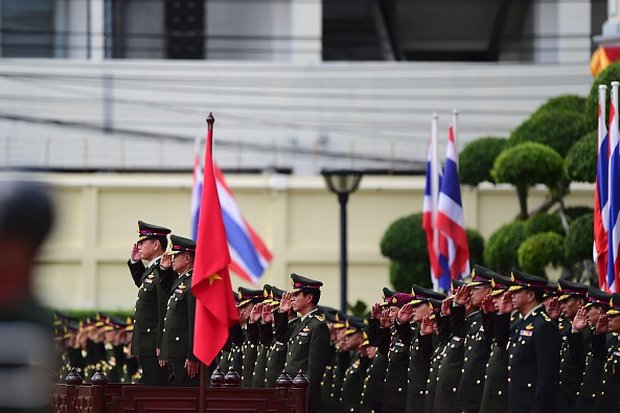
No new power cliques or conflicts will emerge emerge over the annual reshuffle in the army, commander-in-chief Chalermchai Sittisat says.
"Not any more. Never, ever call us Burapha Phayak, Wong Thewan or thahan taengmo. They no longer exist," Gen Chalermchai said, referring to the names of power cliques in the army which made headlines in the past.
He said he adheres to the merit system, a mechanism employed to prevent problems associated with frustration over promotions seen as unfair by some.
Burapha Phayak (Tigers of the East) referred to the faction of army officers who had served at the 2nd Infantry Division of the Queen's Guard based in Prachin Buri while Wong Thewan is the group of officers whose career paths were groomed at the 1st Division of the King's Guard in Bangkok.
In the past, Wong Thewan factions dominated top posts in the army. But after Gen Anupong Paojinda assumed the position of army chief in 2007, Burapha Phayak took over the top post in the army.
The power path for Burapha Phayak was paved by Deputy Prime Minister Gen Prawit Wongsuwon, the big brother of the faction, when he was the army chief during Thaksin Shinawatra's tenure.
However, the power momentum of Burapha Phayak was disrupted by Gen Chalermchai, who is from the "red beret" Special Warfare Command based in Lop Buri.
He took over as army chief on Oct 1 last year.
Meanwhile, thahan taengmo (watermelon soldiers) refers to those soldiers who are with the army yet loyal to the red-shirt United Front for Democracy against Dictatorship (UDD) that is widely perceived as being an opponent of the army.
Gen Chalermchai said conflicts in the army in past years arose because some people were dissatisfied with past reshuffles and that is possibly how the slang term thahan taengmo emerged.
As the chief of the army, he said he has been trying to stick to the "merit system" in which people get a promotion or a transfer based on merit alone and without any interference from above, which many would regard as a welcome departure from the past.
"We're now on the right track. And as those younger soldiers no longer see their senior fellows fight [for a promotion] or the army divided into fractions, unity has improved," he said.
The five chiefs of the armed forces now work well together, he said.
When it comes to the annual reshuffle, the central committee of the army considers proposed promotions in accordance with the army's reshuffle procedure, he said. The new army reshuffle line-up would prove what he was saying, he said.
"I don't know for how long I will continue to be in this position. But all I know is I have two years left before retirement and I'm trying my best to build up this [merit] system," he said.


